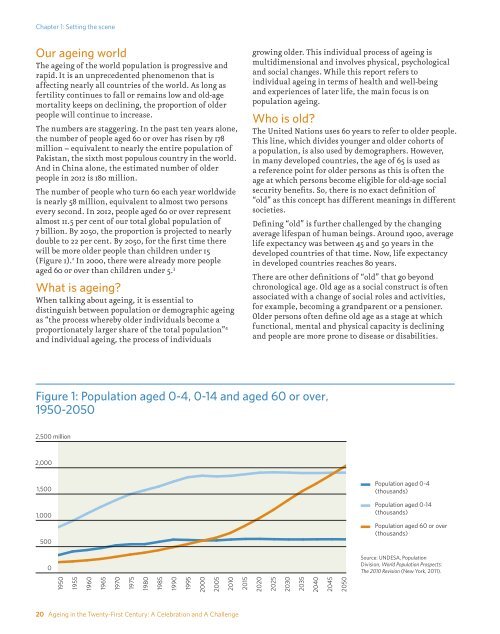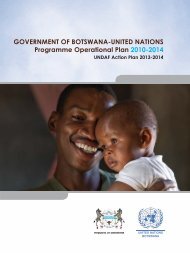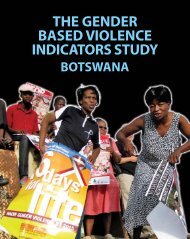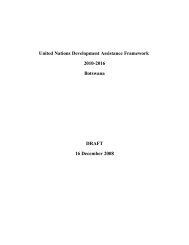Ageing in the Twenty-First Century: - HelpAge International
Ageing in the Twenty-First Century: - HelpAge International
Ageing in the Twenty-First Century: - HelpAge International
You also want an ePaper? Increase the reach of your titles
YUMPU automatically turns print PDFs into web optimized ePapers that Google loves.
Chapter 1: Sett<strong>in</strong>g <strong>the</strong> scene<br />
Our age<strong>in</strong>g world<br />
The age<strong>in</strong>g of <strong>the</strong> world population is progressive and<br />
rapid. It is an unprecedented phenomenon that is<br />
affect<strong>in</strong>g nearly all countries of <strong>the</strong> world. As long as<br />
fertility cont<strong>in</strong>ues to fall or rema<strong>in</strong>s low and old-age<br />
mortality keeps on decl<strong>in</strong><strong>in</strong>g, <strong>the</strong> proportion of older<br />
people will cont<strong>in</strong>ue to <strong>in</strong>crease.<br />
The numbers are stagger<strong>in</strong>g. In <strong>the</strong> past ten years alone,<br />
<strong>the</strong> number of people aged 60 or over has risen by 178<br />
million – equivalent to nearly <strong>the</strong> entire population of<br />
Pakistan, <strong>the</strong> sixth most populous country <strong>in</strong> <strong>the</strong> world.<br />
And <strong>in</strong> Ch<strong>in</strong>a alone, <strong>the</strong> estimated number of older<br />
people <strong>in</strong> 2012 is 180 million.<br />
The number of people who turn 60 each year worldwide<br />
is nearly 58 million, equivalent to almost two persons<br />
every second. In 2012, people aged 60 or over represent<br />
almost 11.5 per cent of our total global population of<br />
7 billion. By 2050, <strong>the</strong> proportion is projected to nearly<br />
double to 22 per cent. By 2050, for <strong>the</strong> first time <strong>the</strong>re<br />
will be more older people than children under 15<br />
(Figure 1). 2 In 2000, <strong>the</strong>re were already more people<br />
aged 60 or over than children under 5. 3<br />
What is age<strong>in</strong>g?<br />
When talk<strong>in</strong>g about age<strong>in</strong>g, it is essential to<br />
dist<strong>in</strong>guish between population or demographic age<strong>in</strong>g<br />
as “<strong>the</strong> process whereby older <strong>in</strong>dividuals become a<br />
proportionately larger share of <strong>the</strong> total population” 4<br />
and <strong>in</strong>dividual age<strong>in</strong>g, <strong>the</strong> process of <strong>in</strong>dividuals<br />
grow<strong>in</strong>g older. This <strong>in</strong>dividual process of age<strong>in</strong>g is<br />
multidimensional and <strong>in</strong>volves physical, psychological<br />
and social changes. While this report refers to<br />
<strong>in</strong>dividual age<strong>in</strong>g <strong>in</strong> terms of health and well-be<strong>in</strong>g<br />
and experiences of later life, <strong>the</strong> ma<strong>in</strong> focus is on<br />
population age<strong>in</strong>g.<br />
Who is old?<br />
The United Nations uses 60 years to refer to older people.<br />
This l<strong>in</strong>e, which divides younger and older cohorts of<br />
a population, is also used by demographers. However,<br />
<strong>in</strong> many developed countries, <strong>the</strong> age of 65 is used as<br />
a reference po<strong>in</strong>t for older persons as this is often <strong>the</strong><br />
age at which persons become eligible for old-age social<br />
security benefits. So, <strong>the</strong>re is no exact def<strong>in</strong>ition of<br />
“old” as this concept has different mean<strong>in</strong>gs <strong>in</strong> different<br />
societies.<br />
Def<strong>in</strong><strong>in</strong>g “old” is fur<strong>the</strong>r challenged by <strong>the</strong> chang<strong>in</strong>g<br />
average lifespan of human be<strong>in</strong>gs. Around 1900, average<br />
life expectancy was between 45 and 50 years <strong>in</strong> <strong>the</strong><br />
developed countries of that time. Now, life expectancy<br />
<strong>in</strong> developed countries reaches 80 years.<br />
There are o<strong>the</strong>r def<strong>in</strong>itions of “old” that go beyond<br />
chronological age. Old age as a social construct is often<br />
associated with a change of social roles and activities,<br />
for example, becom<strong>in</strong>g a grandparent or a pensioner.<br />
Older persons often def<strong>in</strong>e old age as a stage at which<br />
functional, mental and physical capacity is decl<strong>in</strong><strong>in</strong>g<br />
and people are more prone to disease or disabilities.<br />
re 1: Population aged 0-4, 0-14 and number of persons aged 60 or over, 1950-2050<br />
Figure 1: Population aged 0-4, 0-14 and aged 60 or over,<br />
1950-2050<br />
2,500 million<br />
2,000<br />
1,500<br />
1,000<br />
500<br />
0<br />
Population aged 0-4<br />
(thousands)<br />
Population aged 0-14<br />
(thousands)<br />
Population aged 0-4<br />
Population aged 60 or over<br />
(thousands) Population aged 0-14<br />
Population aged 60 or over<br />
Source: UNDESA, Population<br />
Division, Source: World UNDESA Population Population Prospects: Division, World Population<br />
The 2010 Prospects: Revision The (New 2010 York, Revision 2011). (New York, 2011).<br />
1950<br />
1955<br />
1960<br />
1965<br />
1970<br />
1975<br />
1980<br />
1985<br />
1990<br />
1995<br />
2000<br />
2005<br />
2010<br />
2015<br />
2020<br />
2025<br />
2030<br />
2035<br />
2040<br />
2045<br />
2050<br />
20 <strong>Age<strong>in</strong>g</strong> <strong>in</strong> <strong>the</strong> <strong>Twenty</strong>-<strong>First</strong> <strong>Century</strong>: A Celebration and A Challenge







